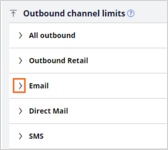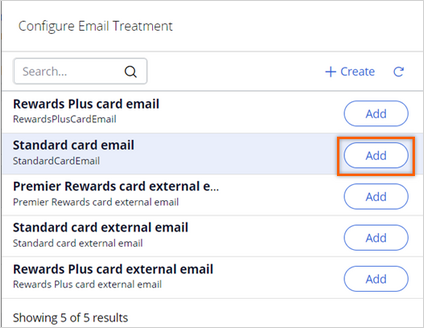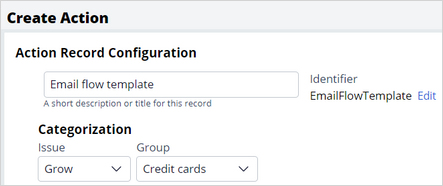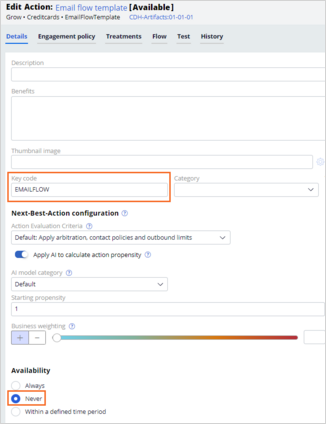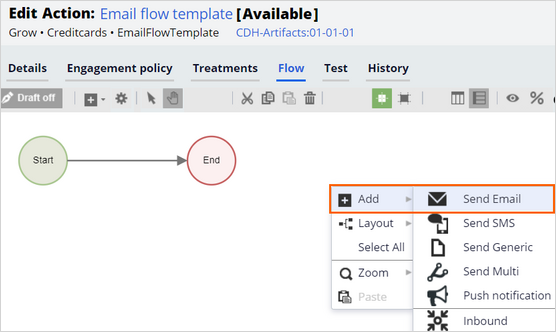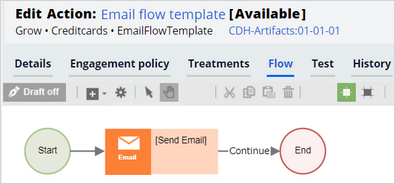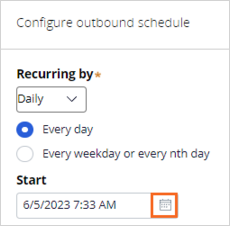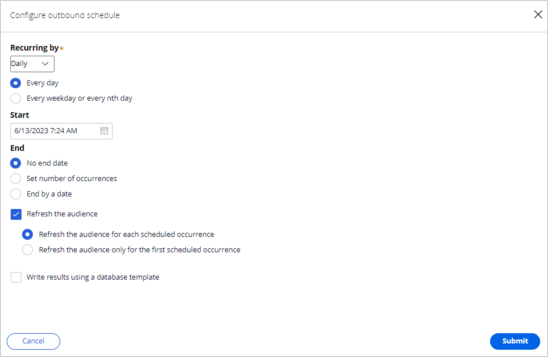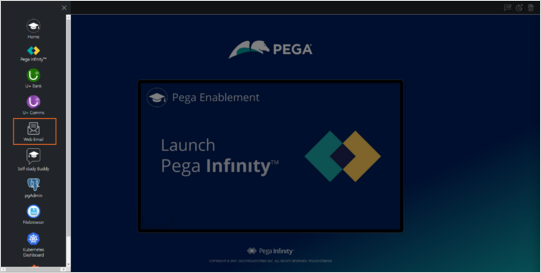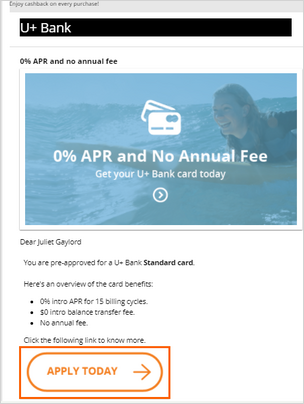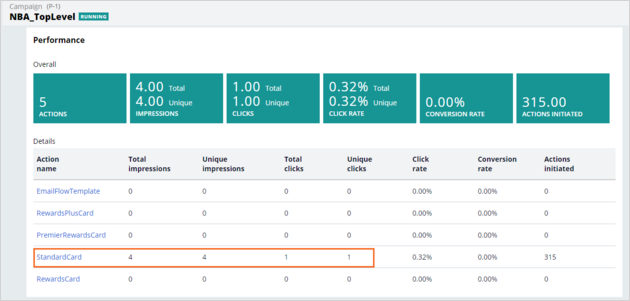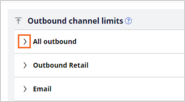
Sending offer emails
5 Tasks
20 mins
Scenario
U+ Bank has recently implemented a project in which credit card offers are presented to qualified customers when they log in to the web self-service portal.
The bank now wants to promote the same offers through email. They want to send an email message to qualified customers. The bank wants to promote only the Standard credit card on the email channel to start.
In preparation, a consultant has already created the Standard Card action, email treatment, and action flow.
You are now expected to make the remaining configurations in Pega Customer Decision Hub™ to present the Standard credit card offer to all qualified customers.
Use the following credentials to log in to the exercise system:
| Role | User name | Password |
|---|---|---|
| Decisioning Architect | DecisioningArchitect | rules |
Your assignment consists of the following tasks:
Task 1: Increase the All outbound channel limit and the Email channel limit
Increase the All outbound channel limit to 50 within 30 days and the Email channel limit to 10 within 7 days.
Task 2: Add email treatment to the Standard card action
Configure the Standard card action to add the email channel with an email template, Standard card Email.
Task 3: Configure the Standard card action flow
Configure the Standard card action flow to use the dynamic template, Email flow template.
Task 4: Ensure the Email channel is enabled and configure a scheduled run
In the Next-Best-Action Designer > Channels tab, ensure the Email channel is enabled and configure a scheduled run.
Task 5: Confirm that the customers receive the promotional email
Confirm that the customers receive the promotional email for the Standard card action. Also, verify that the click-through link takes the customer to the Credit Cards landing page.
Challenge Walkthrough
Detailed Tasks
1 Increase the All outbound channel limit and the Email channel limit
- On the exercise system landing page, click Launch Pega InfinityTM to log in to Customer Decision Hub.
- Log in as a Decisioning Architect:
- In the User name field, enter DecisioningArchitect.
- In the Password field, enter rules.
- In the navigation pane of Customer Decision Hub, click Next-Best-Action > Designer to open Next-Best-Action Designer.
- In Next-Best-Action Designer, click Constraints to access the channel and action limits.
- On the Constraints tab, click Edit to modify the limits.
- In the Outbound channel limits section, expand All outbound.
- In the Maximum number of actions field, enter 50.
- In the Within time period field, select 30 days.
Note: The starting point of the exercise system is the financial services template, where the default contact policy for the All outbound actions is 2 actions in 1 day and 15 actions in 7 days. For training purpose, you increase this value to 50. In your implementation, you choose a value that suits your company's contact policies.
- Delete the channel limit with 15 actions in 7 days.
- In the Outbound channel limits section, expand Email.
- In the Maximum number of actions field, enter 10.
- Click Save.
Note: The starting point of the exercise system is the financial services template, where the default contact policy for the email channel is 2 emails in 7 days. For training purposes, you increase this value to 10. In your implementation, you choose a value that suits your company's contact policies.
2 Add email treatment to the Standard card action
- In Next-Best-Action Designer, click Engagement policy.
- In the Business structure section, click Grow > Credit cards.
- In the Grow/Credit cards section, expand Customer actions.
- In the Actions area, click Standard card to open the offer details.
- In the Standard card details, click Check out to make changes.
- Click the Treatments tab to view existing treatments for this action and configure new treatments.
- On the Treatments tab, click Add channel > Outbound > Email to add a new email treatment.
- In the Configure Email Treatment window, to the right of Standard card email, click Add to add the treatment to the action.
- Click Apply to confirm the treatment selection and close the window. The treatment is now added to the action.
- In the Email section, ensure that the email treatment is enabled.
3 Configure the Standard card action flow
- In the Standard card details, click the Flow tab.
- To the right of Dynamic template, click None to configure an existing flow template.
- In the Configure Dynamic Template window, click Create to create a dynamic email flow template.
- In the Create Action window, enter or select the following information:
- Short description: Email flow template
- Issue: Grow
- Group: Credit cards
- Click Create and open to open the Edit Action window.
- In the Edit Action window, enter/select the following details:
- Key code: EMAILFLOW
- Availability: Never
- Click the Flow tab to configure the action flow.
- Right-click on the canvas and select Add > Send Email.
- Open the Send Email shape properties.
- Ensure Use associated treatment option is selected.
Note: The Use associated treatment option ensures that the treatment that you selected in the Treatments tab is used for sending the email.
- Close the Send Email shape.
- Connect the Start component to the Send Email component and then the Send Email component to the End component. To connect two components, hover over the Start component, select the gray triangle on the right, click on it and hold, and draw an arrow to the Send Email component.
- Delete the connector between Start and End components in case you still have one.
- Click Save to save the values that you entered.
- Close the Email flow template action.
- In the Configure Dynamic Template window, click refresh.
- To the right of Email flow template, click Add to add the dynamic template to the action.
- Click Apply to confirm the flow selection and close the window. The action flow is now added to the action.
- Click Check in to save the changes and provide a suitable check-in comment when prompted (for example, Treatment added, Action flow configured).
- Close the Standard card details.
4 Ensure the Email channel is enabled and configure a schedule run.
- In Next-Best-Action Designer, click Channels.
- Click Edit to make changes.
- Ensure the Email channel is active.
- Scroll down. In the Primary Schedule section, in the Recurrence area, click the Gear icon to schedule run frequency.
- In the Recurring by section, select Every day.
- In the Start section, click the calendar icon.
- Set the time to the current time in the US EST time zone
- Click Today to populate today's date as the Start date.
Note: You can select a time in the past. However, the primary schedule run configuration cannot accept a past date.
- In the End section, ensure that No end date is selected.
- Select the Refresh the audience check box to ensure that the latest customer information is always used when running the schedule.
- Click Submit.
- In the Starting population area, click the Gear icon to select the customers who are qualified to receive the outbound message.
- In the Configure Audience window, to the right of All outbound customers, click Add to add the segment.
- Click Apply to confirm the segment selection and close the window.
- Click Save to save the changes made to Channels.
- In the Primary Schedule section, click the More icon (three dots), and then select Run to run the outbound schedule.
Note: When you refresh the tab, the status changes to Running when it starts processing. An entry for upcoming runs appears in the Runs section.
- Click Action > Refresh to see the latest status of the run.
Note: The run takes several minutes. If no entry is displayed in the Runs section, and the Primary schedule is in the Running state, check the time that you set for the run. The time must be in the past, otherwise, the run is scheduled for the next day. If you need to change the time, you first need to suspend the run (by clicking the 3 dots) and then set an appropriate time.
- Once the run is complete, click COMPLETED to view the results.
Note: Your run results number might not match the numbers shown in the exercise steps as the segment used in the exercise system selects a random sample of customers in each run.
5 Confirm that the customers receive the promotional email
- In the browser tab where you accessed your Pega Academy exercise system, click Application Switcher > Web Email.
- Login to the Citadel server (using the following credentials):
- In the User name field, enter [email protected].
- In the Password field, enter customer1.
- In the left-hand menu, click Mail to access the mailbox and open emails to record impressions to simulate customer behavior.
- In the email message, click APPLY TODAY to record clicks and simulate positive customer behavior.
- Return to Customer Decision Hub portal.
- On the Channels tab, open the primary schedule.
- Check the current activity of the run that you have just initiated.
Available in the following mission:
If you are having problems with your training, please review the Pega Academy Support FAQs.
Want to help us improve this content?

